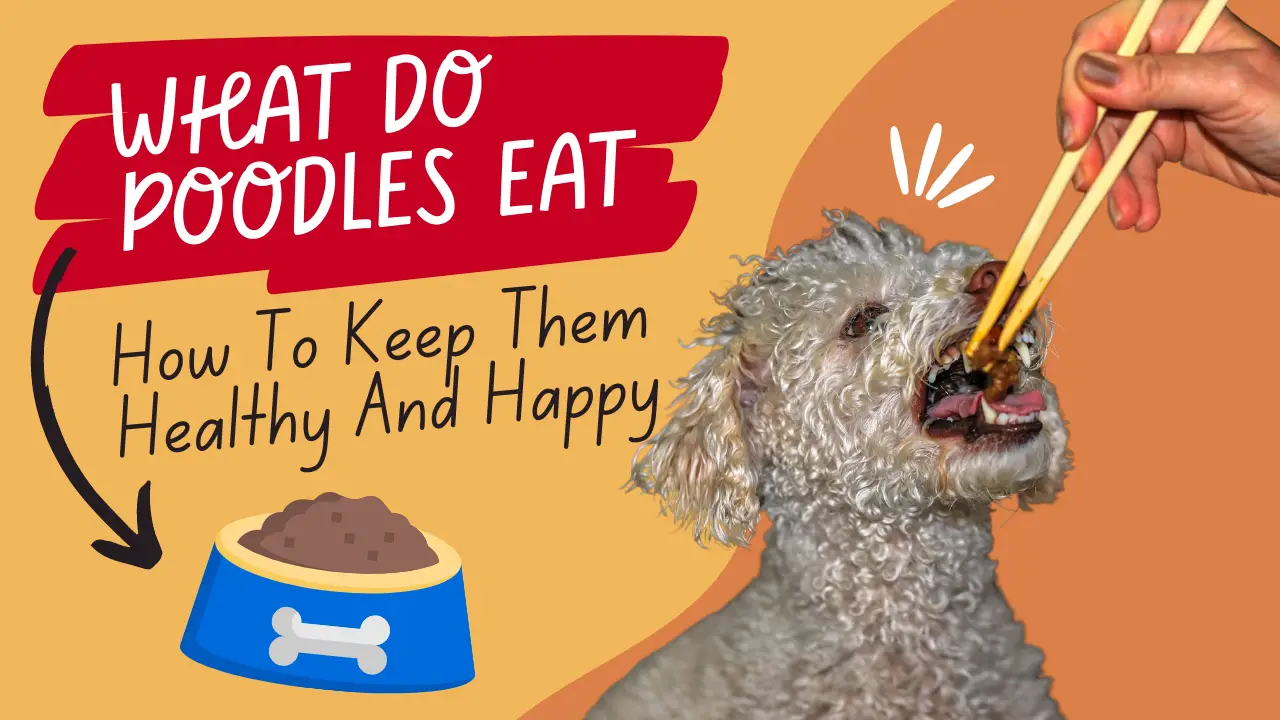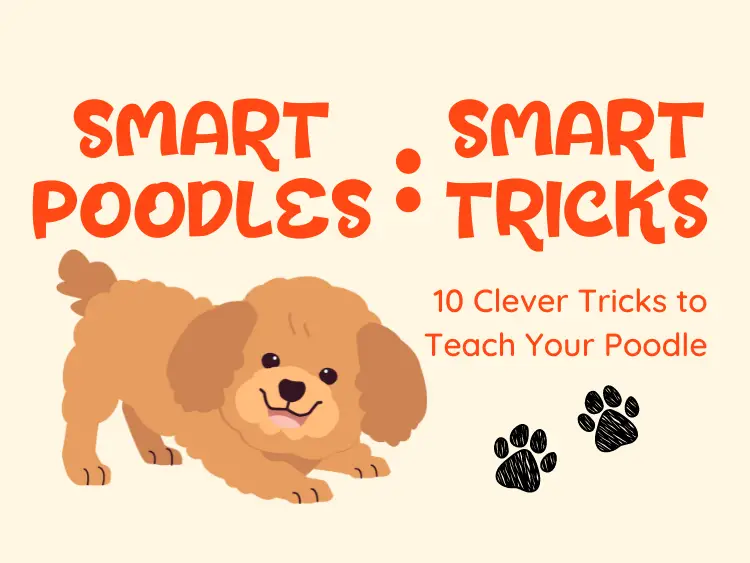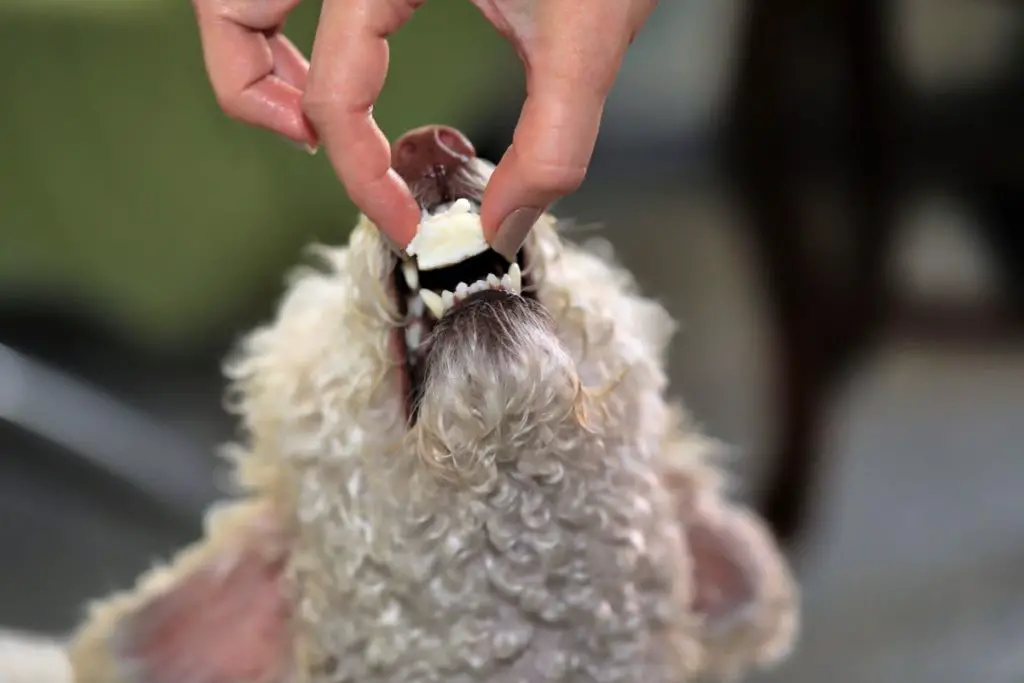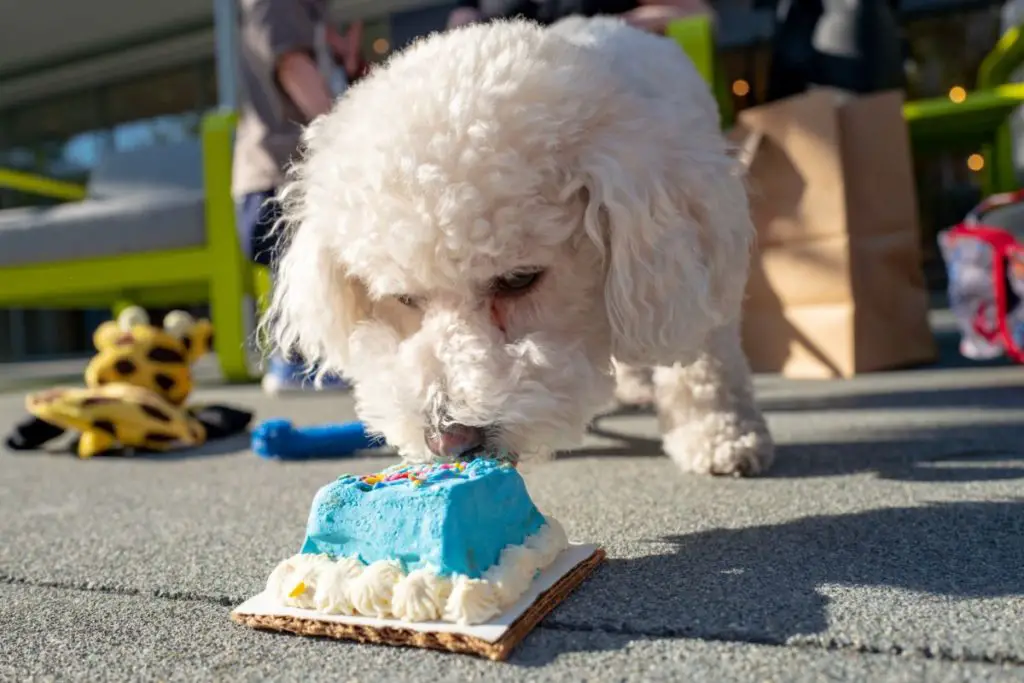Since Poodles are known as picky eaters, many owners are worried about their Poodle’s diet.

It’s hard to resist those big pleading puppy dog eyes in a cute, curly-haired face, but it’s usually not a good idea to feed your Poodle typical human food.
A lot of human foods are full of salt, fat, and sugar. These processed ingredients can mess up a Poodle’s caloric intake and digestive system.

Read our Smart Poodles - Smart Tricks eBook for only $2.99
Dive into a treasure trove of engaging tricks and tips designed specifically for your poodle!
The good news is that there are several human foods that you can feed your Poodle along with nutritionally balanced dog food.
Poodles eat soft, cooked chicken, beef, turkey, salmon, and lamb. They can also eat green beans, peas, spinach, carrots, zucchini, pumpkin, broccoli, sweet potatoes, celery, cucumbers, and white potatoes.
When choosing a Poodle food, check out brands such as:
It’s best to steer clear of gluten, wheat, chemicals, artificial, colorings, preservatives, and GMOs since these can cause allergic reactions or make your dog feel sick.
First, look for 100% natural ingredients and zero fillers. Read the label to identify natural preservatives such as mixed tocopherols or herbal blends like mint or rosemary.
Next, check for healthy ingredients that include chicken, turkey, lamb, beef, rabbit, duck, salmon, whitefish, haddock, and cod.
While some Poodles might need to skip all grains, most Poodle types thrive on certain non-wheat-based, high-fiber, and non-gluten whole grains such as quinoa, oatmeal, and rice.
Make sure that your Poodle also gets the vitamins and minerals that they need either from a dog food brand or from other food sources.
Top supplements to include in your Poodle’s diet are glucosamine and chondroitin to promote joint health, omega-3 fatty acids that support your dog’s skin and coat, and probiotics for your dog’s immune and digestive systems. You can find these in salmon, fish oils, flaxseeds, and plain, unsweetened yogurt.
What Will You Learn? 👇
How Much Do Poodles Eat a Day?
Adult Poodles and Poodle puppies will have very different nutritional needs. You’ll want to make sure that you give adult dogs enough food (based on their size and activity level) and refrain from overfeeding puppies or smaller types such as Miniature or Teacup Poodles.

If you are feeding your Poodle homecooked food instead of canned food or kibble, you can follow these general guidelines that will vary based on which ingredients you decide to use.
Standard Poodle puppies will eat 4-5 meals per day, while adults will eat 2 meals. Reduce the amount of food for smaller dogs or as the dog gets older.
A good rule of thumb to follow is that one daily serving size is 1 ounce of food per 1 pound of body weight.
How Often to Feed a Poodle?
You can follow these feeding schedule guidelines to make sure that your pet gets enough food.
- Puppies under 3 months old:
While you’ll want to eventually get your Poodle onto a regular feeding schedule, it’s best to free-feed newborn pups and puppies under 3 months old.
This means that you’ll want to leave food out and available for free-range eating all day. This can add up to 4-5 meals per day.
You’ll also need to make sure that the food is fresh to avoid any tummy troubles. Don’t just top off old food with new food. Instead, scrub and rinse out any food bowls as needed during the day and replace it with fresh food. Your puppy will thank you.
- Puppies:
Once a puppy reaches 3 months old, you can gradually start training them to a schedule with 3 full meals a day, along with snacks when your pup seems hungry. This applies to Standard, Toy, Miniature, and Teacup Poodle varieties.
- Adults:
Once your Poodle grows into an adult, you can decide how often per day to feed your dog. While some owners think that adults should only receive one meal per day, the truth is that most Poodle varieties thrive better on 2-3 meals per day.
Although a Standard Poodle might handle one dinnertime meal, Toy or Miniature Poodles benefit from several small meals per day.
Consider breaking up a single meal into two servings or offering your Standard or smaller Poodle snacks throughout the day to ensure that your pet gets enough calories each day. This is especially important if your Poodle tends to gulp his food quickly and ends up feeling hungry faster. Older dogs might eat slower and require less food.
Home Cooked Meals Your Poodle Can Eat
If meals from PetPlate aren’t your thing, you can whip up a tasty and healthy meal right in your own kitchen. The main thing is to ensure that your Poodle gets a safe and balanced variety of nutrients.

If you want to give your pet a home-cooked meal, aim for low-sodium dishes that include natural proteins from plain meats or cooked eggs, gluten-free grains, fruits, and vegetables.
Vet tip: Any owner considering a homemade diet must consult with a canine nutritionist first.
Try cooking and blending some protein with vegetables to give your pet a great combination of fresh nutrients:
- Broccoli and Salmon
- Carrots and Chicken
- Cod and Sweet Potato
- Turkey, Peas, or Corn
- Green Beans and Pork
- Unsalted Peanut Butter and Quinoa
You can also blend some of these fruits with a whole grain for a fiber-packed smoothie for your Poodle:
- Apples and Bananas
- Oatmeal and Strawberries, Blueberries, Raspberries, or Peaches
- Cantaloupe
- Cranberries
- Mangoes
- Oranges
Offer fillers like bread, fattening nuts like unsalted cashews, or overly sweet fruits like bananas only in moderation or as a treat, since bread contains unnecessary carbs, cashews cause weight gain, and bananas are high in sugar.
Avoid feeding Poodles chocolate (which can induce a heart attack), macadamia nuts (toxic to dogs), raisins & grapes (cause acute kidney failure), cherries (which have a choking risk due to pits), onions, garlic (anything in the Allium family can cause weakness, respiratory issues, and collapse), wild mushrooms, avocado (poisonous for dogs), alcohol, or xylitol.
How Long Do Puppies Eat Puppy Food?
Poodle puppies should eat puppy food until they reach maturity at 12 months. You can offer your puppy canned food, which many puppies enjoy the most, semi-moist food, or dry kibble moistened with water depending on what your pet seems to enjoy best.
Why Do Poodles Eat Paper?
Maybe you caught your pooch gnawing on a cardboard box or gulping down a shred of a paper napkin. Although it might just seem like normal chewing behavior, consuming paper products can indicate a more serious nutrient deficiency.
There are several common reasons why Poodles might eat paper.
- They Have a Nutritional Deficiency
Like humans, dogs can develop a condition called Pica that causes them to consume inedible objects.
Pica indicates that your dog is lacking vital minerals such as iron in its diet. If your Poodle is eating too much incorrect human food instead of balanced dog food or if they aren’t eating enough calories for their size, your Poodle might try to eat something else to appease his hunger.
- They’re Bored
If Poodles don’t get enough exercise or mental stimulation, they will likely start eating paper or other objects.
Poodles are one of the smartest dog breeds, so eating paper is a way both to entertain them and get a sensory release.
- They’re Experiencing Separation Anxiety
Another reason why your Poodle might eat paper is that they are alone too much. Some dogs can panic when you leave. Chewing on something, such as paper, can help release that negative emotion.
- They Have Dental Issues
If your Poodle is eating paper, you can get their gums checked for tartar buildup or sensitive gums from a gum infection.
Why Do Puppies Eat Grass?
While occasionally nibbling on grass usually isn’t cause for concern, it’s best to check your puppy’s diet if you notice that they like to eat grass. When puppies are hungry, even if they act like they’re eating a lot, they’ll scavenge grass or other things to try to get the nutrients that their body craves.
Why Do Puppies Eat Poop?
If you notice your Poodle pup eating poop, it’s another warning sign that your dog isn’t getting enough nutrients.
Even if your puppy is eating a lot, he or she may not be consuming enough nutrient-rich food or may have absorption issues. When a dog doesn’t get the nutrients that its body needs, it may eat its own feces or the feces from another dog. When this happens, it’s best to check their diet or take your dog to the vet for a checkup.
Marko is the founder and author at PoodleHQ, where he blends profound expertise with formal training in Animal Behavior and Canine Genetics. With multiple generations of poodles under his care, he’s a breed connoisseur, honored with the Canine Care Excellence Award and lauded by the International Pet Enthusiasts Association.

